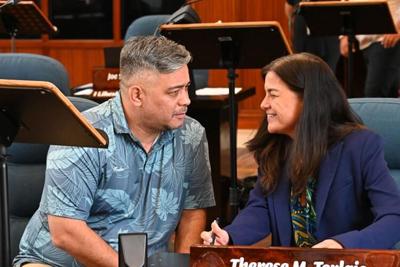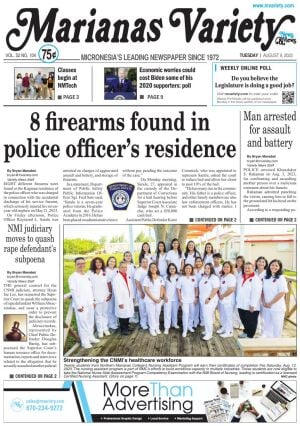HAGÅTÑA (The Guam Daily Post) — Lawmakers went into emergency session Monday to consider allowing more flexibility on sanitation regulations, among other things, as the school system works to try and reopen by Aug. 23.
The start of the typhoon-delayed school year is about three weeks away, and the Guam Department of Education is faced with the dual task of fixing damages caused by Typhoon Mawar and getting already dilapidated schools to comply with sanitation regulations for the first time in years.
GDOE officials - even before Mawar struck - were asking for a rollback of Public Law 37-4, which earlier this year pushed the timeline for schools to get in line with sanitation regulations up from next summer to June 30. The Leon Guerrero-Tenorio administration has said the law “ties the administration’s hands” and will result in numerous school closures.
Though lawmakers aren’t considering a rollback of the law yet, and education chair Sen. Chris Barnett has been steadfast in his commitment to it, Speaker Terlaje’s newly introduced Bill 156-37 is aimed at giving the school system more leeway on problems that they are already working to fix, and help fixing them.
P. L. 37-4 already allows the Department of Public Health and Social Services to issue variances, or exemptions, on sanitation violations that occur at different schools.
GDOE has asked for over 140 variances already, Terlaje during emergency session Monday, including a district-wide variance for busted AC units, which are being offset by the installations of fans. But the speaker said that the variances authorized by the law can’t help a school avert shutdown, even if they are working to mitigate sanitation violations.
Francine Salas, acting chief environmental public health officer, told lawmakers that lawmakers could be issued if a school did not fail its sanitation inspection. But if a school failed, even by just one demerit point, no variance could be issued. Schools will only get a variance if they are already working to deal with a sanitary violation.
"The main thought behind it was really the safety of the children, so it's not a blanket free pass to allow for any sort of major deficiency not to be addressed," Salas said.
Bill 156, cosponsored by Barnett, would simply strike the section about variances from the current law.
Besides that, the bill allows for a number of changes to the law meant to help schools reopen. That includes letting GDOE conduct “small purchases,” which don’t have to be bid out competitively, on supplies or service worth up to $250,000 through the first half of fiscal year 2024.
It would also allow for Public Health to hire retired health inspectors to keep up with backlog of school inspections, and for inspectors from other agencies, like the Department of Public Works and the Guam Fire Department to be detailed to Public Health to assist with school inspections.
Salas said that there are still 34 schools which need to be inspected, and the department is inspecting schools at a rate of about three per week using three teams of inspectors. If staffing could be increased to five teams, five schools could be inspected per week, she said.
Public Health Deputy Director Peter John Camacho told lawmakers that there are already a few retired inspectors who have expressed an interest in coming onboard, though bringing in help from other agencies may require more training.
“I do believe that the schools can do this,” Terlaje told her colleagues Monday. “I think we're not all happy with the plans to double session. That’s actually going to have to happen, but even for that we need a set amount of schools to be ready … And so this, I think will get us faster to that.”
'Not really desirable'
GDOE has already stood up a task force to iron out how double sessions will be handled in the upcoming school year, and according to Erika Cruz, acting deputy superintendent for educational support. Simon Sanchez High School, hard hit by Typhoon Mawar, is working with John F. Kennedy High School on a double session schedule.
"Double session is not really desirable, especially for younger kids," Kenneth Swanson, GDOE's new superintendent, told lawmakers. "But it's a lot more effective than an online (instruction). We know that does not work with small children, and it certainly doesn't work with family work schedules."
Swanson said that the public school system's objective in coming weeks is to get enough elementary schools ready to open up so that double session for elementary students can also be stood up, with schools close enough together to avoid any major transportation hurdles.
Other measures
Republican Minority Leader Sen. Frank Blas jr. on Monday said he was concerned that Bill 156 tackled too many different subjects. The legislative standing rules require that all bills besides the annual budget act deal with only one subject, and Terlaje’s bill was a “goulash of different subjects, in violation of our standing rules,” Blas said.
Vice Speaker Tina Muña Barnes, presiding over session, ruled that the bill was not in violation of the Legislature’s rules after consulting with legal counsel.
Lawmakers recessed around 3:30 p.m. on Monday, and are set to reconvene at 11 a.m. Tuesday.
Other education-related measures that will be entertained at the emergency session include:
Bill 91, which would allow GDOE to hire retired facilities and maintenance personnel.
Bill 149, which adopts rules and regulations for the expediting the spending of federal money held by GDOE.















